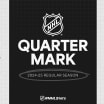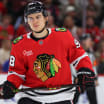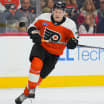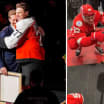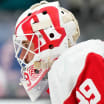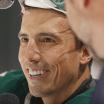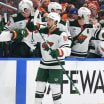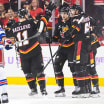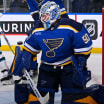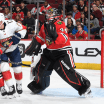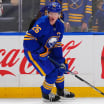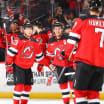NHL.com is providing in-depth analysis for each of its 30 teams throughout August. Today, the biggest reasons for optimism and the biggest questions facing the Winnipeg Jets:
The Winnipeg Jets have preached a long-term approach, and that future finally may be arriving.
A last-place finish in the Central Division in 2015-16 has done little to dampen enthusiasm in Winnipeg entering the sixth season of general manager Kevin Cheveldayoff's tenure.
Reasons for optimism, questions facing Jets
Patrik Laine bringing excitement to Winnipeg, but goaltending remains in flux
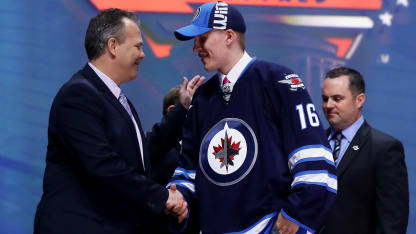
© Bruce Bennett/Getty Images
By
Patrick Williams
NHL.com Independent Correspondent
Armed with a stash of high-end prospects, Mark Scheifele blossoming into a first-line center, and the possibility of Connor Hellebuyck emerging as their No. 1 goalie, the Jets and their fans have found plenty of reasons for excitement.
Jets 30 in 30: Season outlook | Top prospects | Fantasy outlook
Video: 30 in 30: Winnipeg Jets 2016-17 season preview
Here are four reasons for optimism entering this season:
1. The arrival of Patrik Laine
Over the years, the Jets have lacked a true sniper, an offensive weapon capable of putting fear into opponents and taking over a game. Veteran right wing Blake Wheeler has shown signs of being able to fill that role, but he also is counted on to play heavy minutes and manage a young dressing room.
Laine, the No. 2 pick in the 2016 NHL Draft, could be that player. He excelled against high-end competition at the 2016 IIHF World Championship in May, showing he was able to play with and even dominate NHL-caliber competition.
"[Laine's arrival] creates that level of excitement of knowing that you have a potential top player in your midst," Cheveldayoff told the Jets website. "The excitement level of being able to draft Patrik internally, within the confines of the team and the [dressing] room, those are pretty exciting moments."
2. Connor Hellebuyck creating goaltending competition
Cheveldayoff and coach Paul Maurice have stuck with goalie Ondrej Pavelec even when the veteran has struggled for long periods.
But Hellebuyck has moved to the edge of the Winnipeg crease, and Pavelec finally has premier competition for the job he has held since the 2009-10 season.
Pavelec may be able to fend off Hellebuyck's challenge during training camp, but any lapse will lead to calls for Hellebuyck to supplant him as the Jets' No. 1 goaltender. Pavelec last faced a serious challenge to his grip on the starting job when Michael Hutchinson emerged as a threat in the 2014-15 season. Pushed by Hutchinson, Pavelec put together one of his finest stretches of work, helping the franchise to its first appearance in the Stanley Cup Playoffs since 2007, when it played as the Atlanta Thrashers.
3. Mark Scheifele's emergence as a top-line center
Ever since the Jets chose Scheifele with the No. 7 pick in the 2011 draft, critics have wondered whether he had the ability to compete against some of the top centers in the Western Conference.
Aided by his fanatical devotion to training and nutrition, Scheifele added considerable bulk (up to 207 pounds) as he grew into his 6-foot-3 frame and is able to meet the physical demands the role entails. He had an NHL career-high 29 goals last season and was pushed into a top-line role when Bryan Little sustained a compression fracture of his T6 vertebrae that ended his season in February.
Scheifele's growth will allow the Jets to use the dependable Little as a No. 2 center, filling a void they've had for years. The face of Winnipeg's youth movement, Scheifele also possesses potential as a future captain.
4. Better special-teams play
Poor special teams have long dogged the Jets and undermined their bids for postseason play.
Laine and his wicked one-timer should add an instant wrinkle to a power play that was 30th in the NHL last season (14.8 percent).
The signing of free agent center Shawn Matthias provides a much-needed boost for the penalty kill, which ranked 25th (78.4 percent).
Here are three key questions facing the Jets:
1. Are the prospects ready?
The commitment to draft and develop is the central building block of Cheveldayoff's plan, and it has been able to bring several top prospects to the brink of the League.
"We added some depth and created real competition [among the bottom-six forwards], and that is going to put some players that were on our team at the end of the [last] season in a really competitive environment for camp," Maurice told the Jets website. "It's going to be a real challenge and we're looking forward to putting those players under that kind of pressure. For some of these young guys, we're looking for some growth at camp."
But the final step to becoming everyday NHL players is a big one. Even holdover centers Alexander Burmistrov and Andrew Copp must take the next step in their development.
The Jets have invested heavily in youth, including Laine, Hellebuyck, forwards Kyle Connor and Nic Petan, and defenseman Josh Morissey, and are counting on those prospects to make that final step. However, if those players fail to do so, the Jets have minimal leeway.
2. Will the goaltending hold up?
Goaltending is a perennial source of angst in Winnipeg.
If Hellebuyck can match and even exceed his success as a rookie (13-11-1, 2.34 goals-against average, .918 save percentage), the Jets finally may have a new No. 1 goaltender.
However, if Hellebuyck is not able to do so and needs more time in the American Hockey League, the Jets will be forced to return to the Pavelec-Hutchinson tandem, one that has struggled more often than not. Hutchinson has not been able to advance beyond a backup role despite Pavelec's inconsistent play, and Pavelec had a .904 save percentage last season.
3. How will Jacob Trouba's status impact the blue line?
Winnipeg's top four defensemen are as capable as any group in the League.
Veteran Dustin Byfuglien is a fearsome presence, Toby Enstrom is a dependable puck-mover, Tyler Myers is proven, and Trouba continues to grow.
However, there are two potential snags for the Jets.
Trouba remains a restricted free agent. Though there is time to sign him to a bridge contract at the very least, the Jets do not need the distraction of contract strife with one of the most significant building blocks of their future.
Moreover, Trouba has the ability to play on the left side, where Winnipeg is very thin. The loss of him as an option would weaken the defense significantly.
